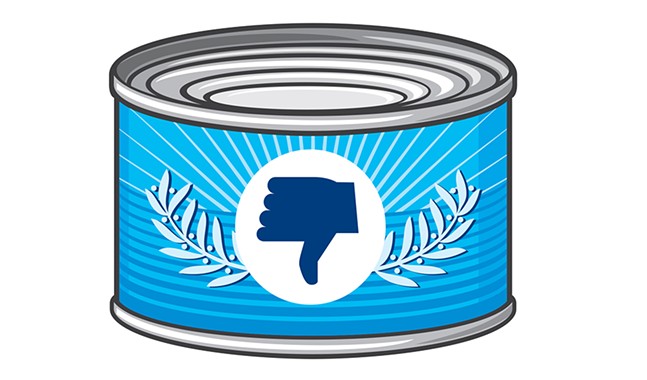StarKist puts millennials on the hook for dropping tuna sales, but the price-fixing probably isn't helping
The Pittsburgh company recently pled guilty to a price-fixing scheme; a lack of transparency raises ethical dilemmas
Blaming millennials for societal changes has become so commonplace, even the tuna-fish industry is getting in on the action.
Canned tuna has become less popular over the years and sales are dipping. According to Food and Wine magazine, canned tuna sales have dropped by 42 percent since the 1980s.
What's the culprit? It’s that “a lot of millennials don’t even own can openers,” according to Andy Mecs of Pittsburgh-based StarKist tuna company, who was recently interviewed in the Wall Street Journal.
Data from research firm Metric shows that younger people are less interested in canned seafood, but there is not much data available on can-opener use.
And while StarKist is eager to pass the buck onto young adults, customers might want to look to other headlines StarKist has made recently. They might shed some more light on the struggles of Pittsburgh's canned tuna giant.
On Oct. 18, StarKist pled guilty to participating in a conspiracy to price fix packaged tuna. StarKist became the second tuna giant to plead guilty to this charge, joining Bumble Bee Foods. Chicken of the Sea has also been implicated.
According to the U.S. Department of Justice, StarKist, which is owned by South Korean company Dongwon, “agreed to fix the prices of canned tuna from as early as November 2011, through at least as late as December 2013.”
The company faces a maximum criminal fine of $100 million.
In a statement to the Pittsburgh Post-Gazette, StarKist CEO Andrew Choe said the company is cooperating with the DOJ’s investigation.
"StarKist is committed to being a socially responsible company and doing the right thing. We have cooperated with the DOJ during the course of its investigation and accept responsibility," said Choe.
But Choe’s claim of social responsibility brings up another aspect that could be hurting canned-fish companies like StarKist.
In 2017, advocacy organization Greenpeace ranked canned-tuna brands “based on how sustainable, ethical, and fair their tuna products are for our oceans — and for the workers that help get the products to store shelves.”
StarKist ranked 20th, dead last. Greenpeace says StarKist’s labels provide no information about the tuna inside its cans, and claimed StarKist sources from destructive fisheries.
Without informing consumers about where exactly the fish are coming from, there’s a chance people could be buying a product fished using slave labor. A 2016 Pulitzer Prize winning investigation by the Associated Press showed that thousands of slaves were used to catch seafood in several Southeast Asian fisheries.
According to the Monterey Bay Aquarium’s Seafood Slavery Risk Tool, most commercial tuna fisheries, which are concentrated in the South Pacific, are at high or critical risk of being fished by slave labor.
Millennials might not be willing to take that risk with canned seafood. According to a 2015 report from Nielsen, 73 percent of millennials said they would pay more for a product that is considered sustainable. Only 66 percent of the general population said the same. And 81 percent of millennials expect companies to make declarations of their corporate citizenship.
So maybe it is millennials' fault tuna is floundering? But only in the way that millennials might actually care about how ethical tuna companies act.
Canned tuna has become less popular over the years and sales are dipping. According to Food and Wine magazine, canned tuna sales have dropped by 42 percent since the 1980s.
What's the culprit? It’s that “a lot of millennials don’t even own can openers,” according to Andy Mecs of Pittsburgh-based StarKist tuna company, who was recently interviewed in the Wall Street Journal.
Data from research firm Metric shows that younger people are less interested in canned seafood, but there is not much data available on can-opener use.
And while StarKist is eager to pass the buck onto young adults, customers might want to look to other headlines StarKist has made recently. They might shed some more light on the struggles of Pittsburgh's canned tuna giant.
On Oct. 18, StarKist pled guilty to participating in a conspiracy to price fix packaged tuna. StarKist became the second tuna giant to plead guilty to this charge, joining Bumble Bee Foods. Chicken of the Sea has also been implicated.
According to the U.S. Department of Justice, StarKist, which is owned by South Korean company Dongwon, “agreed to fix the prices of canned tuna from as early as November 2011, through at least as late as December 2013.”
The company faces a maximum criminal fine of $100 million.
In a statement to the Pittsburgh Post-Gazette, StarKist CEO Andrew Choe said the company is cooperating with the DOJ’s investigation.
"StarKist is committed to being a socially responsible company and doing the right thing. We have cooperated with the DOJ during the course of its investigation and accept responsibility," said Choe.
But Choe’s claim of social responsibility brings up another aspect that could be hurting canned-fish companies like StarKist.
In 2017, advocacy organization Greenpeace ranked canned-tuna brands “based on how sustainable, ethical, and fair their tuna products are for our oceans — and for the workers that help get the products to store shelves.”
StarKist ranked 20th, dead last. Greenpeace says StarKist’s labels provide no information about the tuna inside its cans, and claimed StarKist sources from destructive fisheries.
Without informing consumers about where exactly the fish are coming from, there’s a chance people could be buying a product fished using slave labor. A 2016 Pulitzer Prize winning investigation by the Associated Press showed that thousands of slaves were used to catch seafood in several Southeast Asian fisheries.
According to the Monterey Bay Aquarium’s Seafood Slavery Risk Tool, most commercial tuna fisheries, which are concentrated in the South Pacific, are at high or critical risk of being fished by slave labor.
Millennials might not be willing to take that risk with canned seafood. According to a 2015 report from Nielsen, 73 percent of millennials said they would pay more for a product that is considered sustainable. Only 66 percent of the general population said the same. And 81 percent of millennials expect companies to make declarations of their corporate citizenship.
So maybe it is millennials' fault tuna is floundering? But only in the way that millennials might actually care about how ethical tuna companies act.


















